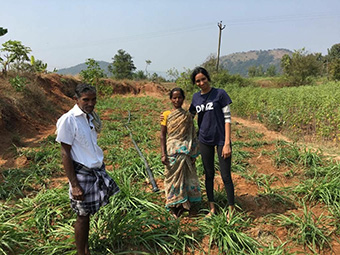Editor’s note: Christine Gould is founder and CEO of Thought For Food; Sayed Azam-Ali is CEO of Crops For the Future.
The last few years have been a feast for plant-based protein producers, especially for trailblazing companies like Impossible or Beyond Meat. Health and environmentally-conscious Millennial and GenZ consumers have already played a role in galvanizing demand here, with one recent survey even pointing to how more than 30% of these generations plan to be completely meat-free by 2021.
Now, the coronavirus pandemic — despite its otherwise grim effects on lives and livelihoods — is further hastening consumer adoption at the retail level. Notably, the contagion has prompted greater awareness of how consuming plant ingredients can assist immune systems. It has also turned media attention onto negative links between industrial meat production and the spread of viral diseases.
Seeing these signs of retail upsides amid the wider economic crisis has spurred food scientists, entrepreneurs, and incumbent food producers into a plant-based product development overdrive. Recently, the FoodShot Global innovation network signaled how it was honing in on precision proteins, which includes those from plant sources. In similar fashion, Radicle Growth is partnering with Syngenta to drive a few of its own solutions. And not to be left out of the search for products in diverse global markets, Thought For Food is working with Good Food Institute India (GFI) to execute a plant-based protein innovation competition for the Indian market. Even veteran dairy giant Danone recently announced their bold intentions to reach 5 billion euros in plant-based product sales by 2025. The tide toward plant-based proteins is turning fast.
And yet, there are few notes of caution to sound. When developing the future of protein from plants, innovators must take heed of key lessons that this pandemic is teaching us about the fragility of our food systems. While Covid-19 is helping to accelerate interest in plant-based solutions, it has also exposed deep cracks in the industrial production methods and the “just in time” supply chains that we rely on. So, here are three things plant-based producers must get right from the get-go:
-
Use regenerative and resilient crop production practices
Our current industrial food system relies on mono-cultures and heavy use of inputs like pesticides and fertilizers. The environmental consequences of these practices? Loss of biodiversity; damaged soil quality; environmental pollution. The human consequences: an increase in diseases associated with diets dependent on calorie-dense, but nutrient-poor staples.
More sustainable agricultural production systems — agroforestry, intercropping, and permaculture — leverage the interplay between biodiverse crops and natural resources. These can replenish soil, save water, and refresh biodiversity. They cause farms to be far more resilient to climate shocks. A common misperception tends to stop these systems. Namely, that these types of approaches are less efficient and more costly for both the producer and end-consumer.
While this might have been true in the past, it is now outdated and wrongheaded. The use of cutting-edge precision agricultural technologies like drones, remote sensors, data analysis, and advanced breeding are seeing to that. And plant-based protein producers need to be sure to be on the right side of this trend.
2. Tap into the thousands of crops that humans can consume
The main crops used for plant-based protein products are currently wheat, soy and pea. Pea protein, for example, is now being used in everything from plant-based meat and milk, through to energy bars and protein drinks. The increasing demand for this crop may lead to the same high-input, high-output economies of scale as with the existing staples.
It doesn’t have to be this way. Humans have farmed more than 7,000 crops. Many could produce healthy and tasty plant-based protein alternatives. For instance, how about the climate-resilient and multipurpose moringa tree? Or, the protein-rich bambara groundnut? Or the nutrient-packed millet? Or the flavorful mung bean? The list goes on, and many of these crops have been cultivated by generations of women farmers whose knowledge, until now, has unfortunately been relegated or lost due to our hyper-focus on the big commodities.
Clearly, these crops represent a huge blank canvas for innovation. Plant-based innovators have the chance to jump in and rethink the possibilities of what we eat by tapping into the vast suite of diverse, nutritious, locally-relevant crops that the world offers.
4. Build circular, inclusive business models.
Diversifying the crops we use and their production systems provides myriad opportunities to develop novel technologies, breeding programmes, and data systems. But that is still not enough. We also need to focus on building more inclusive business models based on circular supply chains that empower smallholders, encouraging a new generation of farmers who would not have considered going into agriculture as a profession.
Transparent and traceable circular value chains increase consumer confidence in the quality, safety and sustainability of foods; they create new value streams that would just go to waste in our current linear systems. In this new normal, we have a strong chance to make more people aware of the food production process and how to improve it – from farmer to supplier to end-consumer, while also whittling down food waste to a minimum.
There’s an impact angle here, of course. Plant-based innovators should look at every stage of the food supply chain and consider not just the economic opportunity, but also the potential for more positive social and environmental impacts at every step.
Thoughts on protein policy
So the global transition towards plant-based proteins represents a chance to rethink and improve our food systems. To get this right, innovators and entrepreneurs — and the investors and companies that support them — should strive to build solutions that foster more sustainable and regenerative agricultural practices, utilize more diverse and nutritious crops, and incorporate inclusive, circular business models.
At the policy level, we need independent comparisons. Not just of novel and existing protein sources, but also between novel and existing agricultural systems. This requires a strong evidence base to help us choose what, when, where, and how to diversify our agrifood systems, while minimizing risks of failure to the grower, and maximizing outcomes for the consumer. After all, making the transition to better food systems isn’t solely about replacing meat with plants. It needs a wellspring of political will, the inclusion and empowerment of a wider range of stakeholders, and a cavalcade of innovative commercial solutions. Today is a special occasion to think about all this as we mark the UN’s World Environment Day; but for anyone working in the plant-based protein space, thoughts like these must also become deeply ingrained in daily routine.





